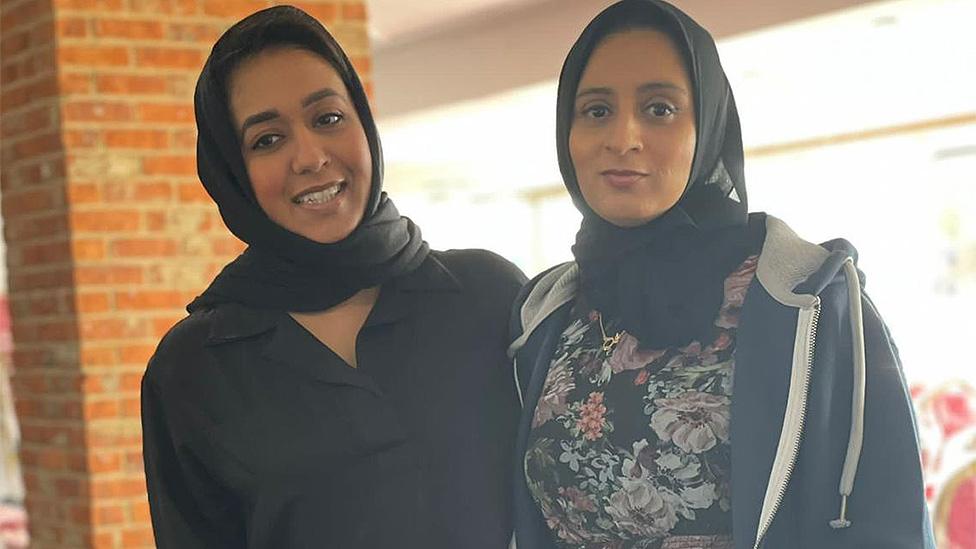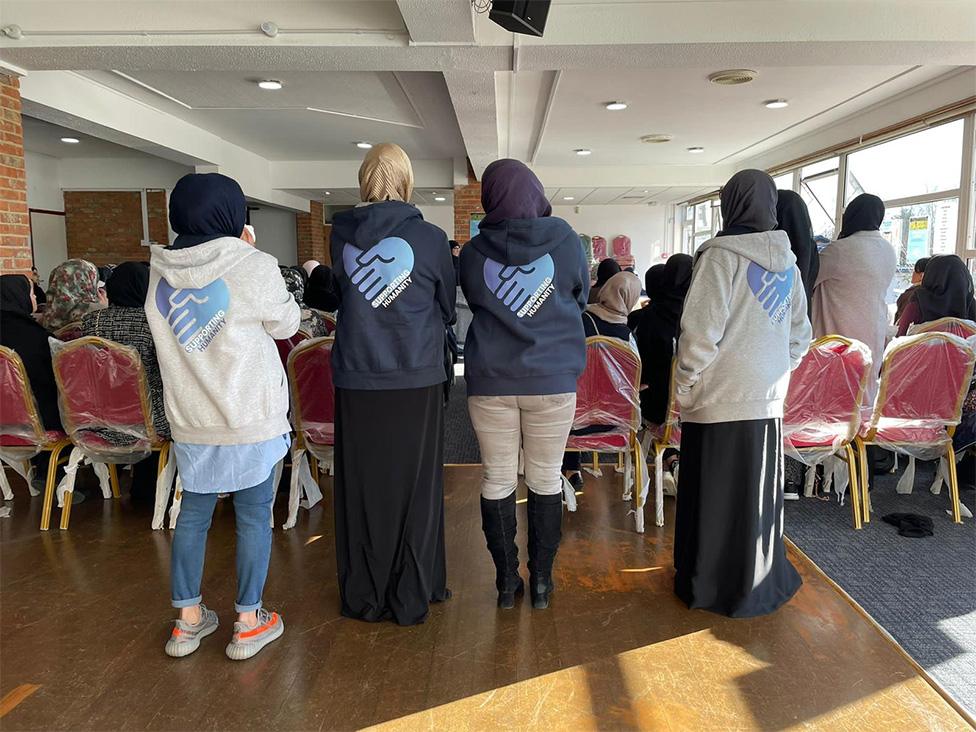Ghusl Mayyit: Why young Muslims are learning the funeral tradition
- Published

Tahreem, left, organised the class to teach Ghusl to young people
A scheme to teach the traditional Muslim funeral ritual of Ghusl to a new generation has been set up in the UK.
Ghusl is the ritual washing and shrouding of the deceased ahead of burial, and is one of a number of certain religious obligations that have to be carried out after death.
Before the coronavirus pandemic, these rites were often carried out by older volunteers in the Muslim community.
But many of them are still shielding to protect themselves from Covid-19.
Supporting Humanity, a bereavement charity, is now holding workshops to train younger volunteers to carry out the mandatory Islamic ritual.
Head of Operations, Tahreem Noor, tells BBC Asian Network at an event held in London, "the initiative came post pandemic when the number of deaths increased" and they "needed more people to help out with funerals".
Similar events are also being hosted across the country.

What is Ghusl?
According to Islamic tradition, the Ghusl is a form of ablution, or bath, which involves cleansing a body from impurities.
There are different types of Ghusl, such as after childbirth and menstruation. The one performed on a deceased Muslim is called Ghusl Mayyit.
It's usually carried out by family members who are the same sex as the person who has died. It involves washing all parts of the body with soap and water in a specific way while maintaining privacy and dignity.

"We need up to six volunteers to do one Ghusl," Salma Patel, from Supporting Humanity, who trains and performs Ghusl, tells Asian Network.
During the Covid restrictions, she says many families were denied performing the religious rites for their loved ones. It was left to volunteers like her to cleanse and shroud around three bodies a day during the peak of the pandemic.
"We can get a call to help at a funeral at short notice," she adds.
In the early days of the pandemic, there was little information about the virus and whether there was any risk of catching Covid from the deceased. Many Muslim organisations, including the Muslim Council of Britain, issued guidance on the performance of Ghusl for deceased persons with suspected or confirmed Covid-19.
At the time, Public Health England advised that ritual washing and shrouding of the deceased in line with religious practice could continue so long as appropriate PPE was worn and social distancing maintained.

Around 90 women attended the workshop in London
The South Asian community in Britain were disproportionately affected by Covid-19. Thousands died from the virus, and that's why Saffiyah decided to attend the Ghusl workshop in East London.
"We lost a lot of loved ones during the pandemic and having to go to funerals and not knowing what to do was definitely a wake up call." she says.
Another attendee, Khadija, 23, feels it's important to learn the technique for upcoming generations because, she asks: 'If we don't learn then who will be washing and burying our bodies in this way?"
Around 90 women attended the workshop for female Muslims at the Belgrave Community Centre in East London. They were shown the techniques of washing and shrouding on a mannequin.
Summaya says she didn't realise the private parts of a dead body are covered by a cloth during the process, because, she says, as a young Muslim woman she was "worried about her privacy after death".
Gay and Muslim: 'My family wanted to make me better'
For young women who attended the class, it was a learning experience they feel was an absolute necessary part of their faith.
Farzana says what she takes away is that "When someone passes away, they'll be referred to as a body - you lose your name, your title, your everything".
Supporting Humanity says the pandemic was a "wake up call" when the elderly were unable to carry out these tasks usually, and sees this new scheme as a way for young people to give back to their community.


Follow Newsbeat on Instagram, external, Facebook, external, Twitter, external and YouTube, external.
Listen to Newsbeat live at 12:45 and 17:45 weekdays - or listen back here.
- Published28 October 2021

- Published29 November 2021

- Published29 December 2021
